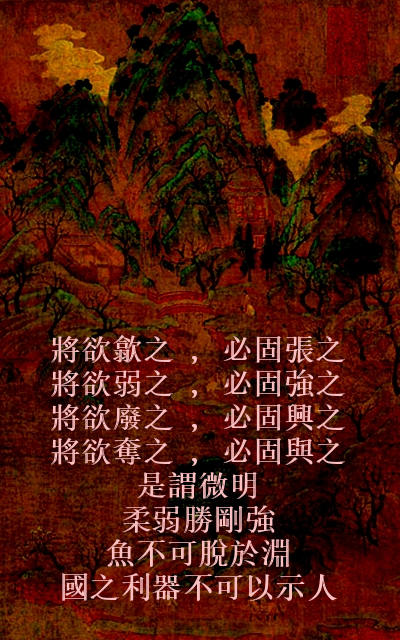道詩 Tao Poem #13

© Tao Fish - bone structure of Daodejing #36 (English commas added).
Copyright ©2019 April 30, 2019
Poetry was highly valued in the ancient Chinese eras, and poetry was often referenced within Confucian writings, the poems having been used as related examples of the writings' topics of discussion.
Numerous individuals have commented that Daodejing also includes various poems... some of the poems being said to be copies or modifications of existing poems, while other poems are said to having been unique.
Regardless of whether or not the 'poems' were intended to be poetry, still the words require translations, and the words still require to be rational relative to the book's topics, else, the whole book falls as nonsense.
Within the first section of Daodejing, numerous translations segregate one of the sentences, and then arrange the words to appear to be a poem. The sentence, all connected, is similar to: 'Therefore common not desire because observe it subtle, common have desire because observe it boundary'.
Some translations create four sentences from the one, which would then appear like:
'Therefore common not desire (gu chang wu yu)
because observe it subtle, (yi guan qi miao)
common have desire (chang you yu)
because observe it boundary'. (yi guan qi jiao)
And yes, the modern pronunciations of the Chinese words do appear to be English-like poetry, but there is no guarantee that the original ancient words were pronounced the same as the modern pronunciations, and, so, there is no known overwhelming reason to insist that the original words were meant to be English-like modern poetry. Old English poetry of only about a thousand years ago used pauses and similar sounds between pauses to be the 'poetry', without using end-words of similar sounds. Likewise, the ancient Chinese texts were not intended for modern English readers of poetry.
For some of us, the Old English way of 'poetry' is far more beautiful and natural... the mental patterning within the Chinese sentence is also far more 'poetic' than the alleged English way of rhyming... eight words, then seven words, a descending tone that blends well with the words' definitions implying a descending contrast.
All of 'Laozi's' words... slow gugin... all rhythmic of pattern that agrees with the words' meanings. All known quality individuals, who, when permitted, speak from their heart, their words flow as songs... the rhythms are beautiful to hear, and the rhythms harmonize with the words' meanings, suggesting strongly that the words are sincere, and honest.
A strong contrast, are the 'poem translations' by various translators. The contrasts are useful as illustrations of how distant many translators' imaginations have wandered from the original texts.
James Legge's 1891 translation with the added Chinese pronunciations:
Always without desire we must be found, (gu chang wu yu)
If its deep mystery we would sound; (yi guan qi miao)
But if desire always within us be, (chang you yu)
Its outer fringe is all that we shall see. (yi guan qi jiao)
D.T. Suzuki & Paul Carus' 1913 translation with the added Chinese pronunciations:
"He who desireless is found (gu chang wu yu)
The spiritual of the world will sound. (yi guan qi miao)
But he who by desire is bound (chang you yu)
Sees the mere shell of things around." (yi guan qi jiao)
The Legge and Suzuki translations are very peculiar... perhaps poetaster... the 'poems' might be deemed to be modern English poems, but the poems do not relate to the original words, nor so much as rhyme in a similar sequence as the original words.
If an individual with knowledge of the topic were somehow coerced into interpreting the Chinese 'poem' into conversational English, then perhaps the English poem might initially resemble something like:
'Therefore, common not desire,
Because observe it interior,
Common have desire,
Because observe it exterior.'
Some individuals with excessive language knowledge, when excited within a stressful scenario, may tend to begin speaking exclamatory words in alphabetical order... the spoken words lend a description of the individuals' personal history of the topics that the individuals have invested much time learning. Some individuals with excessive reading of ancient Chinese poems, when within a scenario of expressing one's own deep thoughts, might tend to speak similarly as the poems.
There is no demanding reason to believe that the Daodejing sentence was intended by its author to be a poem, but, even if the words might have rhymed, then still the rhymes may have only been coincidental or a natural reflection of the author's personal history of interests.
However, the two original words of importance suggest something more. [1] 妙 (miao, implying 'mysterious, subtle') was used four times in Daodejing: used twice in section #1, used once in section #15, and used once in section #26. [2] 徼 (jiao, implying 'boundary, go round') was only used once, and only used in section #1.
The infrequency of the use of 徼 is not much important of itself, but the infrequency correlates with other 'misplaced' words in section #1, which adds to the change of voice between section #1 and numerous other sections, which lends additional weight of suggesting that section #1 was possibly written by a different author. If section #1 was indeed written by a different author, then the wording was as if an overview interpretation of the following texts, which might explain why section #1 is so different from the other sections, and might also raise the question that the two words may have been a natural expression from an author whose personal history valued rhythmic language.
Regardless of anyone's favored interpretation of the words 'jiao' and 'miao' being used within a single sentence, still it will never be possible to know for sure if the words were chosen for their similar sounds, or perhaps merely having been a coincidence.